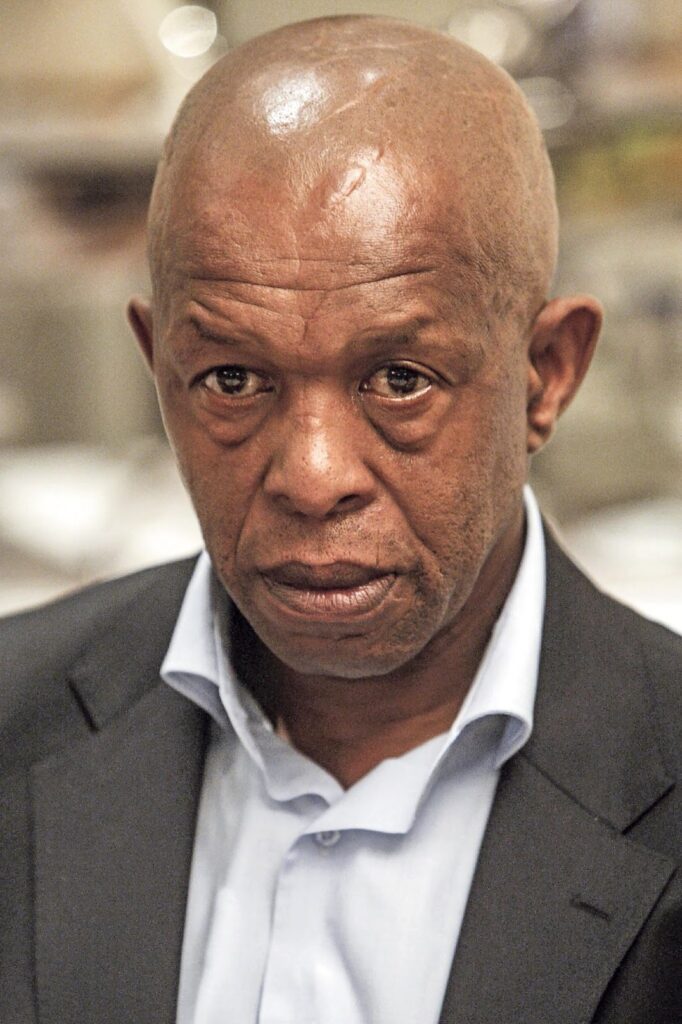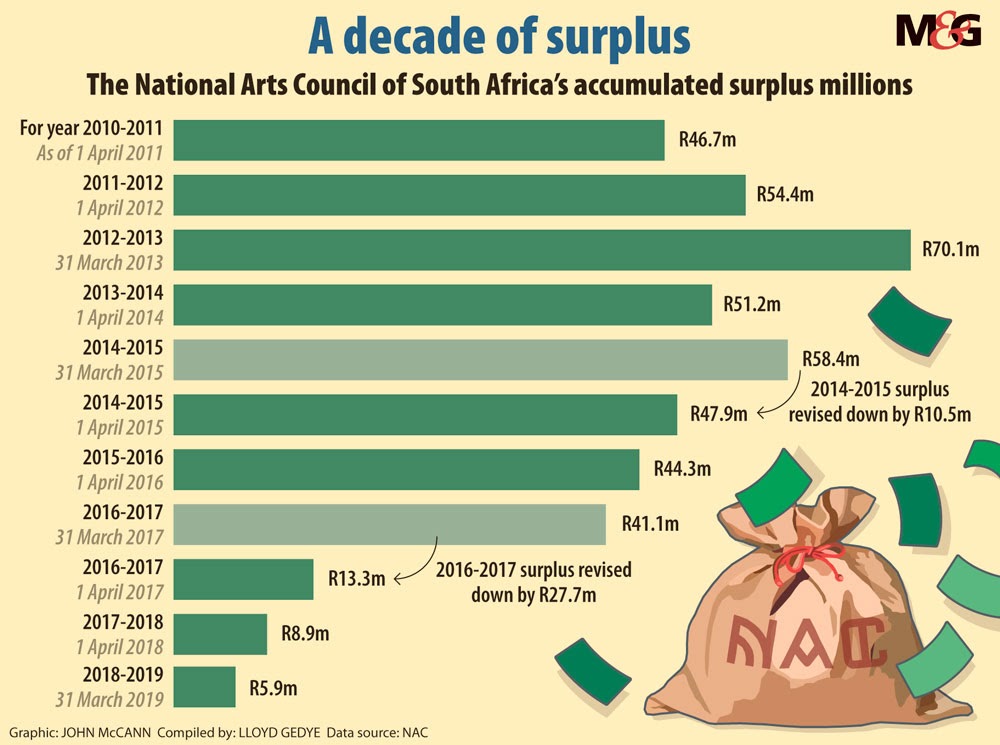Improper: Artists protest against the National Arts Council and the sports, arts and culture department over stimulus funds. (Photo: Brenton Geach/Gallo Images)
As the dispute between the National Arts Council and the artists who applied for the Presidential Employment Stimulus Programme (PESP) rages on, details of council funding irregularities that date back to 2015 are emerging.
Two reports, one from 2016 and another from 2020, have indicated that a council policy used to disburse funding is in violation of the Public Finance Management Act (PFMA) and treasury regulations. Yet the policy remains in place and Minister of Sports, Arts and Culture Nathi Mthethwa appears to have taken no action.
Public protector wades in
In the middle of last week, public protector Busisiwe Mkhwebane got involved in the dispute between the council and artists by announcing in a press release that her office would mediate between the parties.
The press release said the public protector had in the previous week, held two meetings, one with Arts and Culture Minister Nathi Mthethwa and members of the council led by acting chairperson Princess Celenhle Dlamini, and the second with artists.
This was not the first time the council and the department had been in the public protector’s spotlight. In June last, Mkhwebane released a report after a three-year investigation into governance issues at the council that date back to 2015.
The investigation had been sparked by a complaint in January 2017 from Freddie Nyathela, the head of the South African Roadies Association, an organisation that for the past 20-something years has been running training programmes for the events sector.
In her press release last week Mkhwebane said the council would not be in a predicament currently had it implemented the remedial action in her report, arguing that while the council had taken the report on judicial review, the implementation of the remedial action had not been interdicted.
Mkhwebane’s June 2020 report had highlighted irregularities relating to the council’s expired projects and surplus policy, which was found to have “gaps which rendered it prone to abuse”.
It also found that the policy was inconsistent with the constitution, the Promotion of Administrative Justice Act and the treasury regulations and therefore “procedurally unfair” and “not consistent with the spirit of the law”.
When the report was released the public protector gave the council 60 days to align the implementation of its expired projects and surplus policy with the legislative frameworks of the PFMA, the justice Act, treasury regulations, public service regulations and the constitution and to close gaps that would allow exploitation by council officials.
Strange funding application
In the first few months of 2015, Nyathela, of the roadies association, ran into a council official outside the Market Theatre, who asked him how he felt about entering into a partnership with the council. Nyathela said he didn’t know what the official was talking about.
 The SA Roadies Association’s Freddie Nyathela.
The SA Roadies Association’s Freddie Nyathela.
The association had previously made an application for council funding but it had been refused and the association had not applied again.
The Mail & Guardian has seen a submission made to the council’s executive committee (exco). It was signed by the then council chief executive, Rosemary Mangope, and her office manager, Rosie Katz, on 4 March 2015.
The submission, which outlines the council’s proposed flagship projects for the year, lists the roadies association as the second of seven flagship projects, proposing that it receive R350 000 in the first year of its partnership with the council.
Nyathela said: “We never asked for a partnership, we never asked for R350 000.”
The M&G has seen minutes from a council meeting, dated 31 March 2015, which state that Mangope had tabled the submission to council.
Nyathela laid a complaint with the department, believing that this application from Mangope was fraudulent. The complaint resulted in Mthethwa appointing the Business Innovations Group (BIG) to conduct a forensic investigation.
Two reports
The forensic report was delivered to Mthethwa by October 2016, but it was not released publicly and Nyathela says only parts of the report were sent to him by the department.
The M&G has seen a full copy of the report, which does clear Mangope and the council of any wrongdoing because they implemented the expired projects and surplus policy.
But the report found that the policy appears to contravene the treasury’s regulations 6.4.1 and 6.4.2, and the PFMA. This is a similar finding to that of the public protector, which would be delivered more than three years later.
The BIG report says the policy is “not transparent”, “unfair and uncompetitive”, “open to abuse” and described the disposal of surplus funds by an internal submission of a grant application on behalf of an applicant, without their knowledge and without communication from the council to the applicant, as “risky”.
The public protector’s report had found in 2020 that Mangope had “submitted an application to exco for partnership funding using the complainant’s name without his knowledge and consent” and had used the roadies association’s documents from a rejected application to do this. “The complainant was not informed by the CEO about the annual partnership proposal since the policy does not explicitly provide for such an obligation on the part of the CEO,” reads the public protector’s report.
Mkhwebane stated in her report that this amounts to “improper conduct” and “maladministration”.
The BIG report argues that grants awarded in terms of the expired projects and surplus policy must be governed by the same grant funding regulations as normal grants or they may constitute financial misconduct and that the policy does not exonerate the council and grant recipient from adhering to the applicable legislation. It recommends that the “business rationale” behind the expired projects and surplus policy be reviewed and that the council should seek a legal opinion on the validity of the policy.
The policy
The M&G has seen a copy of the council’s policy, signed by Mangope on 15 May 2015 and by the then council chairperson, Angelina Makwetla, on 22 May 2015.
The policy aims to address surplus funds from expired projects. The funds are rolled over to the next financial year and the council decides how this money gets spent.
Nyathela says that when the roadies association’s dispute with the council arose, the council approached the department, which then approached the treasury’s deputy director general for public finances, Dondo Mogajane, who issued approval to the council in August 2015.
Nyathela’s version of events are in a report drawn from the association’s investigation of the council’s recent Presidential Employment Stimulus Programme grant funding, which was finalised in April this year and has been handed to the Hawks.
The M&G asked if the Hawks were investigating the council’s administration of the stimulus programme funding, but did not get confirmation.
The roadies association’s report details surplus funds rolled over by the council from 2012 to 2017.
 A timeline of annual surpluses at the NAC. In a submission to the parliamentary portfolio committee in 2020, Nyathela said the council delayed issuing calls for proposals and the payment of grants in order to pilfer surplus funds. (John McCann/M&G)
A timeline of annual surpluses at the NAC. In a submission to the parliamentary portfolio committee in 2020, Nyathela said the council delayed issuing calls for proposals and the payment of grants in order to pilfer surplus funds. (John McCann/M&G)
According to the National Arts Council’s annual reports, its accumulated surplus at the end of the 2014-15 financial year was R58,4-million. It was the 2014-15 surplus that was being considered when the roadie association was proposed as a partner to the council and before the approval letter from the treasury.
Two years earlier in the 2012-13 financial year the surplus was sitting at R70,1-million, but by the 2018-19 financial year it had been reduced to R5,9-million.
The M&G has seen the letter from the treasury’s Mogajane, dated 21 August 2015, which grants the council permission to retain a surplus of R59-million from the 2014-15 financial year and this letter confirms this request was made in June 2015.
The association says the approval from Mogajane was unlawful and can’t be granted under section 53 (3) of the PFMA.
The M&G put the roadies association’s allegations to the treasury, which said it was not aware of any irregularity in respect of the NAC’s surplus retention for the 2014-15 financial year.
In a presentation to the parliamentary portfolio committee for sports, arts and culture on 13 November last year, Nyathela said the expired projects and surplus policy was “unlawful” and that flagship projects were being abused by “personal interests” in the council.
He said the council delayed issuing calls for proposals and the payment of grants with the specific aim of creating surplus funds.
Mthethwa’s spokesperson Masechaba Khumalo said on Thursday last week that a response would be given by this week. But on Monday department officials said they had only seen the questions that day and that the NAC should respond. The council had not answered the M&G’s questions by the time of publication.